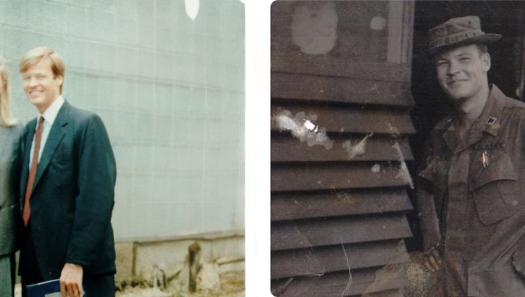Military & Veterans News
Vet News: Montgomery GI Bill Still Important 60 Years Later
Rudi Williams, American Forces Press Service

Times were tough. The nation was slowly emerging from the Great Depression when World War II flared up in 1941.
Before the war, the unemployment rate hovered at 15 percent, more than 11 million homes did not have running water or electricity, and fewer than 50,000 taxpayers earned more than $2,500 a year, according to Census Bureau statistics.
After the war, thousands of Americans were flocking to colleges and vocational schools, buying homes, farms and businesses -- all thanks to the Servicemen’s Readjustment Act of 1944 known simply as the GI Bill. President Franklin D. Roosevelt signed the bill into law 60 years ago June 22.
Passing the GI Bill brought more than 16 million Veterans into a peacetime economy. Since it provided education and home-ownership opportunities to millions, some dubbed the bill the "magic carpet to the middle class."
Historians say the GI Bill contributed more than any other program in history to the welfare of Veterans and their families, and to the growth of the nation’s economy. The bill is credited with preventing a postwar relapse into the prewar Depression.
Its social impact is still felt today, said retired Navy Vice Adm. Daniel Cooper, undersecretary of Veterans Affairs for benefits.
"Several bills were proposed between 1942 and 1944 that were debated and held up," Admiral Cooper said. "But finally, the American Legion jumped in, sat down and wrote the first draft in a hotel room. The American Legion pushed very hard to ensure that a bill did get written and passed. After going through a lot of debate, it passed with a large majority."
One primary reason for the bill was to help millions of young Veterans readjust to civilian life, Admiral Cooper said.
"Another reason was to ensure that the entire nation’s economy wasn’t hurt by the large influx of kids coming back from overseas," he said, "and to ensure that Veterans were not held back because of their military service, and that they were recognized for the (service) they’d given to the country."
Today’s GI Bill benefits are built upon what was done in 1944 -- and improved and increased over the years, the admiral said.
"The benefits then had to do with education and home and business loans, as well as unemployment payments for the first year they came back," Admiral Cooper said. "Today, we cover a wider range of benefits for the same purposes."
During the past 60 years, the GI Bill has made possible the investment of billions of dollars in education and training for millions of Veterans. The nation has earned, in return, many times the investment in increased taxes and a dramatically changed society, Admiral Cooper said.
He also said the bill made possible the loan of billions of dollars to purchases homes for millions of Veterans and helped transform America from a nation of renters to a nation of homeowners.
"All the writings that I’ve seen about the GI Bill say it had a very strong social effect in establishing a strong middle class within the country," Admiral Cooper said.
The first GI Bill provided six benefits, three of which the VA administered: education and training; loan guaranty for a home, farm or business; and unemployment pay of $20 a week for up to 52 weeks. The other benefits were job-finding assistance, top priority for building materials for VA hospitals, and military review of dishonorable discharges, the undersecretary said.
Admiral Cooper said the GI Bill is still a huge benefit to American society.
"Last year, we had (more than) 400,000 men and women in college getting an advanced education as a result of our educational benefit," he said. "Similarly, last year we processed more than 450,000 loans, the third largest number of loans we have in the history of the GI Bill. Many of those loans were refinances because of lower interest rates.”
The amount paid to Veterans per month has increased "quite a bit," Admiral Cooper said. The 1986 Montgomery GI Bill required servicemembers to pay in $100 per month for 12 months.
"However, three years ago the benefit they got was $600 per month for 36 months,” he said. “As of Oct. 1, 2003, that (monthly) benefit increased to $985, … up $385 in the last three years."
Unfortunately, a large number of Veterans who paid into the Montgomery GI Bill do not use it. Admiral Cooper said it is "not something you can generally attribute to a single factor.
"Our job is to ensure that they understand that they’ve paid into the bill," he said. "We even send them letters about it while they’re still in the service."
The importance of today’s GI Bill to American society is probably more important to individuals because a college education is so important, Admiral Cooper said.
"As far as the total effect on our economy, the first one (in 1944) was of major importance," he said. "So I wouldn’t want to try to compare the two. But the importance to the veteran is beyond question."
Admiral Cooper said he has read books unrelated to the GI Bill that talks to the maximum social effect that the bill had in 1944.
"It made a vital difference in the basic structure of our country," he said. "Therefore, the greatness of it socially can’t be underestimated.
"Today our job is to do everything we can to ensure that we have the best benefits we can for our service people," Admiral Cooper said. "This is one of the real benefits."
SOURCE: VNIS


